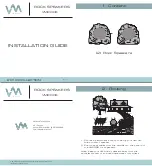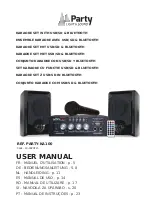
6. Specifications
3. Installation
• Check that the speakers are connected to the cable
correctly.
• Check that the speaker cable is connected to the receiver
amplifier correctly.
• Check that the receiver amplifier is powered “on” at the
mains, is not on “mute”, has no headphones attached and
that the channels used for the exterior speakers (usually A or
B) is in operation.
• Refer to the owner’s guide that came with your receiver
amplifier.
• Most initial problems are connectivity, please try a different
connection cable to your outdoor speakers or equipment.
• Check the “balance” control on your receiver amplifier.
• Check all connections and cable to the inoperable speaker.
• Disconnect the “working” speaker from the receiver amplifier
connection/channel. Switch the cord from the non-operating
speaker from its current connection to the “working” speaker
connection. If the speaker now works, the problem is your
receiver amplifier.
• Reconnect as original. Remove the speaker cable at the
“working” speaker directly and connect it directly to the non-
working speaker. If the speaker now works, the problem is
somewhere in the original speaker cable.
• If the speaker still does not work the problem is the speaker.
• Follow same procedure as above for “No Sound”
No Sound
No Sound
from One
Speaker
Distortion
Speaker Drivers
Woofer
Tweeter
Enclosure
Grill
Frequency Response
Sensitivity
Power
Impedance
Dimensions
Full Range Co-axial Dynamic
6 1/2” PP Cone/Butyl Surround
1 1/2” Mylar Cone
Fiberglass Composite
Aluminum
60Hz - 20kHz
93dB
150W RMS / 300 PEAK
8 ohms
10.63” W x 7.87” H x 8.66” D
Use the color coding of the wires to be sure that positive
goes to positive and negative goes to negative at all the
connection points.
1. Strip off 1/2” of the insulation for each wire.
2. Twist together the two positive or negative wire leads.
3. Push one of the wire nuts onto the ends of the wires
and turn it until it is firmly set.
1. Sink the speaker wire 4-6” underground to prevent
accidental tripping over, pulling or other damages.
Warning! Check the intended path carefully to avoid
damaging any pre-laid plumbing or electric wiring.
5. Troubleshooting
4. Connections




















